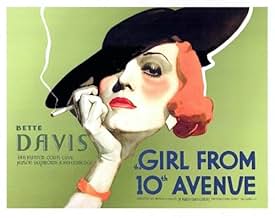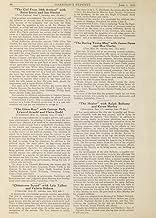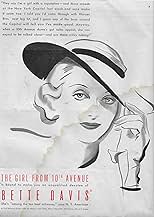IMDb RATING
6.7/10
1.5K
YOUR RATING
A lawyer impulsively marries a stranger after his fiancée dumps him.A lawyer impulsively marries a stranger after his fiancée dumps him.A lawyer impulsively marries a stranger after his fiancée dumps him.
- Awards
- 1 win total
Bill Elliott
- James
- (as Gordon Elliott)
André Cheron
- Max
- (as Andre Cheron)
Vesey O'Davoren
- Servant
- (scenes deleted)
Sam Ash
- College Club Guest Outside Bar
- (uncredited)
Brooks Benedict
- Waldorf Diner
- (uncredited)
Davison Clark
- Detective #2
- (uncredited)
Heinie Conklin
- Waiter at Marchand's
- (uncredited)
James Donlan
- First Detective
- (uncredited)
Featured reviews
She had no sex appeal and was as interesting to watch as paint drying on a winter's day. This is just the opinion of Universal International. Warner Brothers and RKO saw her differently because she garnered academy awards for them.
Bette Davis was 27 when she made "The Girl from Tenth Avenue" in 1935. She's very slim and pretty, and as someone points out on this site, she looks more realistic than Joan Crawford did in these roles because Warners was less concerned with glamor. Davis did some roles in the early days where she was glamored up, such as "The Man Who Played God" and "Fashions of 1934" where she looks very pretty. Even in black and white, those huge blue eyes of hers really pop. When I saw her in person when she toured with John Springer, who interviewed her on stage, that's the first thing you noticed. That and that she looked so much better than she did in most of her roles.
"The Girl from Tenth Avenue" is about shopgirl, Miriam, who takes pity on society drunk Geoff (Ian Hunter) whose ex-girlfriend Valentine (Katharine Alexander) has just married someone else. Miriam marries him, and the two are happy, and he's sober, until Valentine tosses her husband (Colin Clive) out. Then she tears after Geoff. Since Miriam is from a different social class and self-conscious about it, she feels threatened.
Predictable class-conscious drama with nice performances. This is early Davis, before Warner Brothers realized that she was a forceful actress. It would be a couple of years yet before she hit her stride. Alison Skipworth provides the comedy as Mrs. Martin, who tries to counsel Miriam through her troubles.
Primarily for Davis fans.
"The Girl from Tenth Avenue" is about shopgirl, Miriam, who takes pity on society drunk Geoff (Ian Hunter) whose ex-girlfriend Valentine (Katharine Alexander) has just married someone else. Miriam marries him, and the two are happy, and he's sober, until Valentine tosses her husband (Colin Clive) out. Then she tears after Geoff. Since Miriam is from a different social class and self-conscious about it, she feels threatened.
Predictable class-conscious drama with nice performances. This is early Davis, before Warner Brothers realized that she was a forceful actress. It would be a couple of years yet before she hit her stride. Alison Skipworth provides the comedy as Mrs. Martin, who tries to counsel Miriam through her troubles.
Primarily for Davis fans.
Based on the play "Outcast" (from 1914, no less!), The Girl From Tenth Avenue opens by showing us a wedding invitation, and two gentlemen of the wedding party driving towards the ceremony. Then we see Miriam Brady (Bette Davis) and Geoffrey Sherwood (Ian Hunter) standing on a street corner, listening to the wedding that is taking place. Sherwood is drunk, and Miriam decides to take a personal interest in getting him into a restaurant, away from the wedding scene. Although WHY she does, isn't really explained... Davis had just made "Of Human Bondage", and was about to win the Oscar for "Dangerous"... good year for her! Viewers will recognize the landlord Mrs. Martin, played by Alison Skipworth; she made FOUR films with W.C. Fields. Next thing you know, Miriam and Geoffrey are married, apparently skipping a couple of the 12 steps Sherwood SHOULD be going through. There is a lot of talking in this story, as with most plays. It starts pretty slow, but picks up about halfway through. I wonder if this would have been a little more spicy if it hadn't been made right as the Hays Code was starting to be enforced. Davis and Hunter would make five films together in the 1930s.
Katherine Alexander throws over wealthy Ian Hunter to marry richer Colin Clive, so Hunter goes on a pub crawl. Poor but honest Bette Davis goes on the toot with him to see how the better half drink and winds up married to him. She offers him back the ring and the marriage contract, but they decide to keep it going until he's done with her. After nearly a year, with her studying how the upper crust behave under the tutelage of ex-Floradora girl Alison Skipworth, Miss Alexander pushes her husband out and goes after Hunter.... and Miss Davis retaliates.
It's the sort of foolish role that Warner Brothers put Miss Davis in, which she handles in a straightforward and honest manner. Interestingly, two movies later, she would win an Oscar under the same director, Alfred Green.
The script obviously had something to say about the way men and men use each other, but that's lost in the final cut. Certainly, the cavalier manner in which everyone treats manner is a bit of a surprise under the Code.
Ian Hunter was one of those large, good-looking, competent actors, best remembered by playing Richard the Lion-heart and the only one of Jessie Matthews' leading men who didn't seem afraid of women. Born in 1900, he appeared in about ten silent films, played some leads in British films, then moved to the United States for a long stretch. He made his last movies in Italy in 1963 and died a dozen years later.
It's the sort of foolish role that Warner Brothers put Miss Davis in, which she handles in a straightforward and honest manner. Interestingly, two movies later, she would win an Oscar under the same director, Alfred Green.
The script obviously had something to say about the way men and men use each other, but that's lost in the final cut. Certainly, the cavalier manner in which everyone treats manner is a bit of a surprise under the Code.
Ian Hunter was one of those large, good-looking, competent actors, best remembered by playing Richard the Lion-heart and the only one of Jessie Matthews' leading men who didn't seem afraid of women. Born in 1900, he appeared in about ten silent films, played some leads in British films, then moved to the United States for a long stretch. He made his last movies in Italy in 1963 and died a dozen years later.
Knew from reading 'The Girl from Tenth Avenue's' plot synopsis to not expect too much from the story, which in feel is not much different from a lot of other films at that time. Where more often than not one had to suspend disbelief and not watch looking for sense. Bette Davis has done many fine performances and seldom less than watchable (depending on the material of course, with her being unable to do anything good with the bad material in 'Wicked Stepmother' and 'Bunny O Hare'.
Also like what (not enough) has been seen of Alfred E Green's work, prime examples being 'Baby Face' and 'Dangerous', the latter also starring Davis and earned her her first Oscar win (while extremely good in that film quite a number of her other performances were more deserving). Colin Clive's life and career were too short, but he was watchable too and still love the two 'Frankenstein' films he starred in. Seeing 'The Girl from Tenth Avenue' a while back, to me it was good fun and an inoffensive way to spend just a little over an hour but didn't fit my definition of being a great film.
'The Girl from Tenth Avenue' is not one of those films that compels from the get go. It instead takes time to settle and find its footing, starting off a little too slow and having too much of a confined and stage origins feel. Most of the characters are sketchily developed and gives some of the cast too little to do. The cast mostly do a good job though and make the most of what they have to work with, but this was very much a Davis vehicle and it does show a bit in how the characters are written and how much screen time they have. Ian Hunter however doesn't have an awful lot of presence apart from towards the end during his big scene with Davis.
Have said already about not trying to expect too much from the story, and still stand by that with some of it being predictable and quite silly. Especially in the first half. If that is something that has been a common criticism in my recent reviews it is because it was a common factor for films during this period, so reinforcing is inevitable.
Like has been said though, 'The Girl from Tenth Avenue' is not a film to switch off and dismiss prematurely. It really does get better, more gripping and one is rewarded enough when sticking with it. Davis gives a great full throttle performance and of the rest of the performances Alison Skipworth shines the most and on sparkling form. Katherine Alexander also has one of the film's best scenes and Clive brings dignity to an underused role. Green's direction is mostly smart and keeps the high emotions of the drama in the latter stages gripping.
Much of the script is snappy and thoughtfully written, not rambling too much and it doesn't get verbose. It does get over-heated at times but not in a way that's unbearable. The second half of 'The Girl from Tenth Avenue' has plenty of moments of tension and poignancy, especially towards the end with two scenes (aforementioned) that particularly blister, much of it down to Davis being so good. It is well shot and doesn't look cheap.
In summary, not a great film but passes the time more than adequately. 7/10
Also like what (not enough) has been seen of Alfred E Green's work, prime examples being 'Baby Face' and 'Dangerous', the latter also starring Davis and earned her her first Oscar win (while extremely good in that film quite a number of her other performances were more deserving). Colin Clive's life and career were too short, but he was watchable too and still love the two 'Frankenstein' films he starred in. Seeing 'The Girl from Tenth Avenue' a while back, to me it was good fun and an inoffensive way to spend just a little over an hour but didn't fit my definition of being a great film.
'The Girl from Tenth Avenue' is not one of those films that compels from the get go. It instead takes time to settle and find its footing, starting off a little too slow and having too much of a confined and stage origins feel. Most of the characters are sketchily developed and gives some of the cast too little to do. The cast mostly do a good job though and make the most of what they have to work with, but this was very much a Davis vehicle and it does show a bit in how the characters are written and how much screen time they have. Ian Hunter however doesn't have an awful lot of presence apart from towards the end during his big scene with Davis.
Have said already about not trying to expect too much from the story, and still stand by that with some of it being predictable and quite silly. Especially in the first half. If that is something that has been a common criticism in my recent reviews it is because it was a common factor for films during this period, so reinforcing is inevitable.
Like has been said though, 'The Girl from Tenth Avenue' is not a film to switch off and dismiss prematurely. It really does get better, more gripping and one is rewarded enough when sticking with it. Davis gives a great full throttle performance and of the rest of the performances Alison Skipworth shines the most and on sparkling form. Katherine Alexander also has one of the film's best scenes and Clive brings dignity to an underused role. Green's direction is mostly smart and keeps the high emotions of the drama in the latter stages gripping.
Much of the script is snappy and thoughtfully written, not rambling too much and it doesn't get verbose. It does get over-heated at times but not in a way that's unbearable. The second half of 'The Girl from Tenth Avenue' has plenty of moments of tension and poignancy, especially towards the end with two scenes (aforementioned) that particularly blister, much of it down to Davis being so good. It is well shot and doesn't look cheap.
In summary, not a great film but passes the time more than adequately. 7/10
Did you know
- TriviaThe original play opened in New York on 2 November 1914.
- GoofsWhile drinking with John at the College Club, Geoffrey fills his glass in three successive shots without drinking the previous contents.
- Quotes
Geoffrey Sherwood: Now I'm in oil.
Hugh Brown: So is a sardine.
- ConnectionsReferenced in Fat Chance (1981)
- SoundtracksBridal Chorus
(uncredited)
from "Lohengrin"
Music by Richard Wagner (1850)
Played on an organ before the wedding
Details
- Release date
- Country of origin
- Languages
- Also known as
- Men on Her Mind
- Filming locations
- Production company
- See more company credits at IMDbPro
- Runtime
- 1h 9m(69 min)
- Color
- Sound mix
- Aspect ratio
- 1.37 : 1
Contribute to this page
Suggest an edit or add missing content





































